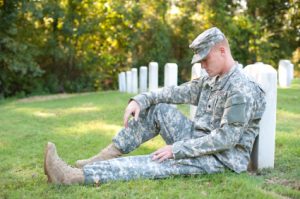Memorial Day: An Opportunity to Reach Out to Veterans

Memorial Day was established as a day for honoring and acknowledging all of the men and women who have died serving the United States. And in this past decade, there have been many. For those who we’ve lost, we can offer remembrance. But now is also a time to call attention to the thousands of veterans who’ve returned from battle whose lives are still at great risk. And for these men and women, we can certainly do even more.
In an eye-opening article on veteran suicide in The Daily Beast, it was reported that, “The number of U.S. soldiers who have died by their own hand is now estimated to be greater than the number (6,460) who have died in combat in Afghanistan and Iraq.” The article pointed out that about 18 veterans commit suicide each day in the United States. Data from the National Violent Death Reporting System showed that “male veterans have a twofold increase in death by suicide over their civilian counterparts and that female veterans are three times as likely to kill themselves as their civilian counterparts.”
I recently spoke to Jan Kemp, RN, PhD, VA National Suicide Prevention Coordinator. She said that although we as a nation are making huge strides, encouraging veterans to seek help and raising community awareness, we have a long way to go. “The holiday is an excellent time to sit back and think about what we can do as individuals to reach out to vets, be a friend, be there for them, encourage them to get services. Friends and family are the people on the ground who can notice the signs and identify that the person needs help and encourage them to get it.”
Jan mentioned to me that calls at the National Suicide Prevention Lifeline are continuing to increase, partly due to the Lifeline’s recent publicity and their community awareness campaign, but also because more soldiers are coming home. A growing population of vets, many who have spent years at war, is now learning that help is available, and it is okay to seek it. Lives can be saved, which is why it is so important to get the lifeline number and website out to those who need it.
Getting veterans to the help they need is imperative. It is also valuable for us to have an understanding of the many factors that lead to increased suicide risk among veterans. A deployment into a warzone can be traumatic beyond words. The horrors of what veterans have witnessed and what they have done can linger in their memory and impact them long after their service has ended. Even when their actions were in self-defense, in response to an order, or in the name of a cause they believed in, on a human level any act of violence can leave a person with post-traumatic stress.
Another factor involves the stress of multiple deployments. The more times a person is exposed to this trauma, the more hopeless he or she can begin to feel. While soldiers may be able to imagine “getting lucky” and surviving once or twice, they often feel a strong sense that the odds are against them by the time they’re deployed for the third time. This leaves them into a state of hyper-vigilance, a state of fear and distrust that persists beyond deployment. After facing constant stress and threat to their lives, how then do they psychologically re-adapt to a safe environment?
A feeling of isolation is another strong factor contributing to increased suicide risk. The uniquely traumatic events veterans experience can leave them feeling distanced from the families and friends they come home to. No one close to them has necessarily seen, heard, or felt what they have. Their sense of alienation is exacerbated when the valuable skills the military equipped them with don’t easily translate into their home lives. This period of distance and disconnect can be dangerous for a veteran, who must reestablish their connection to the world around them in order to feel like they are not alone.
In addition, physical injury and stress can take its toll and increase risk for self-harm in veterans. According to the Military Suicide Research Consortium, “Among the U.S. military personnel who were injured while taking part in Operation Enduring Freedom and Operation Iraqi Freedom, between 10 and 20 percent suffered traumatic brain injuries… Research has shown that Veterans with traumatic brain injury are significantly more likely than other Veterans to die by suicide.”
Even those who are fortunate to leave a war without a severe physical injury must deal with the many mental challenges that result from combat. The warrior mentality that is encouraged in men and women in the military and their acquired ability to hurt or kill others requires a level of desensitization that can be difficult to emerge from and cope with when soldiers return to their “normal” lives.
Suicide and homicide are both acts of violence. Being capable of one makes a person increasingly capable of the other. That is why we must offer a way for individuals returning from war to break from the warrior mentality and reconnect with themselves. We must re-sensitize them by allowing them to feel their emotions and experience empathy, compassion, and peace.
The military has been taking action to implement programs and collect data to address this crisis and offer veterans the services they need. One measure that would be strongly beneficial would be for the military to conduct multiple aggressive assessment screenings over time of returning military personnel. In the meantime, we as individuals, family, friends, neighbors, co-workers, and associates can take actions now that can help save a life. We can do this by recognizing the warning signs for suicide in veterans and supporting them getting the services they need. We can reach out to veterans and their families, and work together to de-stigmatize struggles with mental health. In doing so, are taking action to protect the lives of those who have been deeply wounded in their effort to protect us.
The Veterans Crisis Line connects Veterans in crisis and their families and friends with qualified, caring Department of Veterans Affairs responders through a confidential toll-free hotline, online chat, or text. Veterans and their loved ones can call 1-800-273-8255 and Press 1, chat online http://www.veteranscrisisline.net/, or send a text message to 838255 to receive confidential support 24 hours a day, 7 days a week, 365 days a year.
Tags: community awareness, desensitization, isolation, Memorial Day, National Suicide Prevention Lifeline, Post-traumatic stress, Suicide, Veterans










Leave a Reply